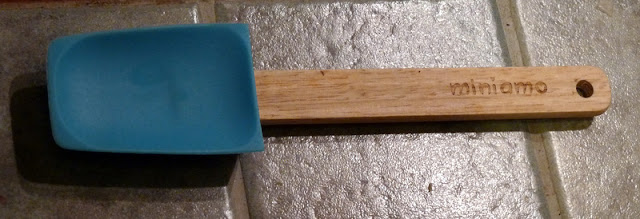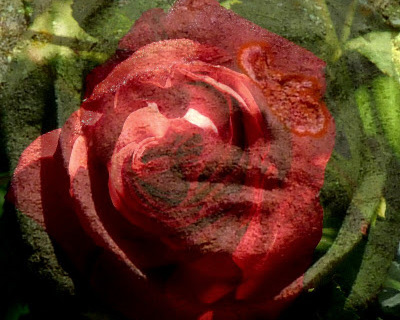So off we went to
le Rosabelle restaurant, a rather handsome, solitary old building out on the road that leads up to Erquy etc, perhaps half an hour's drive away. Not a particularly attractive location in itself though set well back from the road, and so not really a tourist restaurant though they may get some passing trade from people going up to the coast, and they offer plenty of seafood. It's quite a bit cheaper than the seafront places, and we got the feeling it's a place for people who like their food and probably go back regularly. It's very spacious and quite simple, though quite elegant, and they've a second room for functions and loads of parking space and grassy areas outside so probably do well on weddings and other big parties. A big fluffy black cat met us outside and escorted us in.
Tom opted out of
kig ha farz (thanks Setu for the note in the comments before on the correct spelling; I'm happy to say they spelled it properly on the board and menu!) in part because he couldn't resist the oysters on the other menu, and in part because he was wary of the boiled meats.
Here I am going to digress into a bit of a grouch about the things French people often say to British people about our perceived execrable eating habits. Along with the ideas that we are bizarre in enjoying
sucré-salé (sweet and savoury mixed) flavours and that we breadcrumb everything, there is the frequent accusation that we boil all our meat.
Let's address the
sucré-salé question first: yes, we like chutney with all kinds of things, redcurrant jelly with our lamb and other meats, and indeed a number of other sweet and savoury combinations. In doing so we are expanding traditions of spicing and sweetening from afar in space and time coming out of the cuisine of the east and dating back from the mediaeval period all over Europe (admittedly that was partly because the meat was half-rotten and spicing and sweetening it to buggery was one way to make it palatable, but that wasn't exclusive to Britain). But I would also point out that there are many very traditional
sucré-salé combinations in French cooking as well: pork with apple or prunes,
foie gras with cherry or fig conserves, the Provencal (I think) speciality
confiture d'oignons,
the absolutely delectable practice of topping beef
carbonnade with a piece of gingerbread spread with mustard to make a crust, even the addition of orange to beef
daube could be seen as mixing fruit and meat flavours. The very existence of the term
sucré-salé in French has no real English equivalent. So why time and again the snooty wrinkling of the nose and the 'oh but you English like
sucré-salé...'
(Marmalade or even maple syrup on our bacon is not common British practice, but I was introduced to the latter in new Zealand and it was delicious.)
The breadcrumbed coating, well yes I suppose I probably ate my share of fishfingers as a kid, though I liked the battered ones best, but there are plenty of those to be seen in the shopping trolleys of the young French mothers I see in the queues in front of me too, and chicken nuggets.
But it's the meat-boiling thing that really bugs me. I think I can honestly say as an English person I have never at any time boiled any meat. Neither did my mother before me nor hers before her, I'm quite sure ( with the possible exception of boiled bacon, which has to be boiled else one dies of salt poisoning). You, my French friends of my dear adopted land,
you are the ones who boil your meat. You boil your meat in
pot au feu, you boil your meat in
navarin d'agneau, you boil your meat in
poule au pot (as your good king Henri-Quatre wished that you should, every Sunday)
, you boil your meat in
daube de boeuf and in
boeuf à la ficelle, and doubtless you boil your meat in sundry other regional specialities I know not of.
J'accuse. You boil your meat.
We, the English, we do not boil our meat. We roast it. That is why when you wish to insult us mildly you call us
rosbifs. QED.
Anyway, this is going nowhere, as I don't imagine many French people read here in any depth, apart from
Setu, who is Breton anyway, and apparently at home in every language, place and culture under the sun, or at least in Europe, and hopefully will forgive me the anglocentric rant.
Not that I'm saying one shouldn't ever boil, or at least simmer it (
mijoter is a nice word) meat, because the results can be excellent, which brings me back to the
kig ha farz. The two ladies who were serving, who were super and very efficient, one brisk and a bit formidable, the other prettier and more kindly (she kept bestowing special smiles on Tom, we think it was his jacket), brought me a one huge russet-coloured earthenware pot containing meats and vegetables in broth and another plate with a slightly smaller dish containing the buckwheat dumpling (the
farz, I believe) also in some broth and a little pot of mustardy sauce.
'It's all for you,' the more bossy one told me 'it's very copious.'
I looked at it.
'Can I have a takeaway container for the leftovers?' I asked.
They happily brought me one, and brought Tom his oysters, then his monkfish, which very well cooked but the cherry sauce - hey, more
sucré-salé! - was a bit strange both to look at and to taste, overall he was happy, though half wishing he'd been bolder and joined me in the
kig ha farz. They had served me very promptly, I had no starter and barely time to eat any olives and crackers with my
aperitif, so my appetite, which I had been nurturing all day, was not spoiled. I ate slowly, and my one course lasted through three of Tom's, and I just kept on and on eating it.
Among the meats there was a piece of beef, shreddingly tender and flavourful, a piece of ham hock, a good chunk of sausage and a small bit of
demi-sel (salt-cured belly pork), which was the kind of thing Tom was fearful of because of fat and gristle, but which was so meltingly tender that the fat was almost rendered away. So the meat was good but in one of the really nice things about it was the vegetables; there was a good quarter of cabbage, plenty of onion, a piece of fennel bulb, a big potato, a long baton of carrot, and several bits of cardoon. It's quite unusual to get such a vegetable rich meal here, in fact, and because everything had cooked in and on the broth it was full of flavour and texture. As to the buckwheat preparation, it was certainly substantial! Not quite how I imagined, less crumbly - sometimes I gather people roll and pound the bag before they take the
farz out of it, so it breaks into crumbs rather the consistency of couscous - with some sultanas in it (I'm not sure that purists go along with these, but I've seen quite a few recipes which add them) and a taste a bit like chestnuts. I've eaten plenty of buckwheat pancakes and cooked the grain as an accompaniment, but this was different again.
As Tom was getting to the end of his cheese course ( a proper good-looking cheese board that you could have whatever you liked from) I announced that I was going to finish it all, and apart from a bit of broth and sauce and some trimmings, I did. Tom asked if I wanted any of his cheese which I declined that, but still ate some ice cream afterwards. Ice cream can always find some gaps to slip through, I find. The two serving ladies almost patted me on the head and said to one another
'Look, she's eaten it all, no leftovers!' and took the take away container away again.
It was just the day after the
Beaujolais nouveau had arrived, and they were offering that, along with
Côtes du Rhône nouveau (
primeur, I think, strictly), which I'd not come across before. I never cared much for
Beaujolais nouveau (I like the
crus, don't mind the
villages)
but I was happy to try the other and enjoyed it.
When we got there at 8-ish there were a couple of couples already installed, but it filled up with a pleasantly mixed clientèle, a small group of oldies, a huge family group with babies and teenagers and all, all well-behaved at least while we were there, and then behind us two women, who were maybe a couple, with another elderly couple and a beautiful cream colour Alsatian-cross dog who sniffed at me politely and only got a little bit excited when the cat swept past rather teasingly. The older lady made a very indulgent fuss of the dog who seemed to belong to the two women. They all shared a
kig ha farz and so then it came with the different elements in separate dishes which they dipped into as they wished, which would be a really nice way to eat it. I've just got to find a few more people who'd like to join me...
( If you look at the menus on the restaurant site, the
kig ha farz counts as
tête de veau, which is prepared on another Friday in the month. We won't be heading out for that one, I'm afraid; I'm not that assimilated or adventurous.)























































